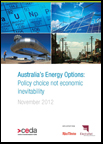PROGRESS 2050: Toward a prosperous future for all Australians
31/10/2012
 |
|
 |
14 November 2012
CEDA's latest research being released today has found that state governments should divest their ownership of energy network service provision assets to help curb further electricity price rises for households.
In releasing CEDA's final report in its Australia's Energy Options series, CEDA Chief Executive, Professor the Hon. Stephen Martin said the final report examined the Australia electricity market and found that in states such as NSW and Queensland, where state governments have maintained ownership of electricity assets, price rises have been the most significant.
"Unlike the Federal Government's Energy White Paper released last week, which attributed the rising electricity prices to increasing peak demand resulting in a lack of productivity in energy infrastructure, CEDA's research has found that it is the ownership structures of energy utilities that are driving energy price increases," he said.
"In particular it is the perverse incentives of state government owned network service providers to grow their regulatory asset base which is a significant contributor to price increases for households in these states.
"State governments are effectively using their utilities as a means of indirect taxation, in part because they get extraordinary income that private operators cannot get."
In addition to privatisation of state owned energy assets, Professor Martin said the report also recommended that steps be taken to speed up the roll-out of smart meters and time-of-use pricing, a consumer energy use education campaign be developed, and a review of energy concession provisions be undertaken.
"Smart meters would allow the introduction of time-of-use pricing which would provide households with more control over their energy bills by allowing them to make decisions about when they use high energy consumption appliances and at what price," he said.
"This needs to coincide with a significant consumer education campaign to help educate households about their energy use and the real cost of electricity, such as during peak demand periods.
"Billions is being invested in energy infrastructure to manage peak demand periods, such as extremely hot days when there is a spike in air conditioner use, where as if we can educate consumers about the impact of their use, we can reduce network costs by reducing the investment needed in new infrastructure, reducing everyone's energy bills."
Professor Martin said CEDA's latest research also found that a national review of energy hardship concessions was needed, in particular to examine concessions for families.
"This research has found that families may be at increased risk of energy hardship, particularly those with young children, but may not be able to access concessions. Energy is an essential service and given rising electricity prices in recent years, it is timely that a national review of energy hardship provisions be undertaken to ensure it is reaching all those in need," he said.
Professor Martin said another key issue addressed in this CEDA series which also formed part of the report recommendations was around nuclear energy.
"The exclusion of nuclear energy in the Federal Government's Energy White Paper is a serious omission," he said.
"If Australia is serious about mitigating the effects of climate change then nuclear must be on the table, it has the potential to provide low-cost, clean, baseload energy and will be an important back-up if other renewable or clean energy options do not come to fruition.
"It is important that steps are taken now, such as the development of a regulatory framework, to ensure this option can be utilised in the future if necessary."
This report follows three policy perspectives in this series on nuclear energy, renewables and efficiency and unconventional energy options. The report will be launched at an event in Sydney at noon (14 November, 2012), with Federal Minister for Resources and Energy, Martin Ferguson.
To download a copy of the report click here.
 |
 |
|
